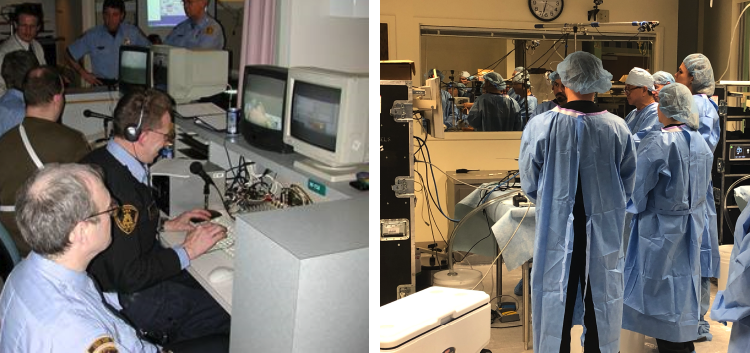
Peter M. Winter Institute for Simulation Education and Research (WISER)
When you think of Pittsburgh, Pennsylvania, several things may come to mind: its reputation as the Steel City, its numerous bridges, or maybe even those professional sports teams with an obvious affinity for yellow and black uniforms. There’s a WISER group, though, that want Pittsburgh to be seen as a leader in healthcare simulation education and training. Of course, I’m talking about the folks at the Peter M. Winter Institute for Simulation Education and Research, or as its commonly referred to, WISER.
Nestled in Oakland, the city’s academic and medical district, is WISER’s headquarters. The nearly 18,000 square foot healthcare simulation facility has come a long way since its early days. The Program was once concentrated in the University of Pittsburgh’s Anesthesia Department, but it was not destined to stay small. “A couple of our sort of Pioneers for WISER that included Dr. Peter Safar, who is the person who invented mouth-to-mouth resuscitation, and Dr. John Schaefer III, who was the founding Director of WISER, and a few other key people at the University of Pittsburgh at that time recognized there’s a great advantage to becoming a multidisciplinary simulation center,” says current Director, Dr. Paul Phrampus, MD.
That vision for the future of the Program started to come to fruition when the Anesthesia Department began collaborating with the University’s School of Nursing. Later, the Program expanded further to include pharmacy students, respiratory therapist students as well as students from a variety of other disciplines. Today it has grown even more thanks to its collaborative relationship with the 38-hospital UPMC Health System. “Over the last eight years, we’ve opened up eight satellite centers that reside within our hospitals,” says Phrampus.
These facilities, he explains, are co-managed by WISER and the UPMC hospitals; with WISER providing the simulation expertise and the hospitals providing the subject matter expertise to co-develop the simulation scenarios. Phrampus feels as though this is an advantageous model for the patients served because the satellite centers conduct simulation trainings that are tailored to specific patient populations at the UPMC specialty hospitals like Magee-Womens Hospital and the Children’s Hospital of Pittsburgh. “It allows a tighter focus, and I think, a more efficient as well as effective implementation of simulation when we can allow a local hospital’s mission to intersect with the mission that we bring to the table to meet the needs of the patients at that particular facility,” says Phrampus. Over the last year, more than 100 in situ simulations have been conducted at UPMC hospitals.
WISER also has a very active relationship with one of Pittsburgh’s helicopter emergency medical service providers. “They do about 16,000 missions a year total and we play a very active role in their annual competencies and on-going assessments. We also helped them get started with a simulation room of their own for when they don’t need a big facility,” states Phrampus.
Another training initiative that Dr. Phrampus is proud to say WISER has been involved in focuses on UPMC’s response to highly infectious diseases like Ebola. The training course WISER developed and thoroughly evaluated for effectiveness has helped to set UPMC apart from other hospital systems in the state. “We’ve continued on with that [Program] and helped the state of Pennsylvania run a couple of assessments at a number of our hospitals in terms of how do we interact with local EMS, and doing very detailed assessments of that type of work, which lead us to become one of the first centers in Pennsylvania certified for highly infectious disease response,” Phrampus explains. He says it’s been exciting to be involved with an on-going quality improvement project with the Pennsylvania Department of Health.
When learners aren’t training to prevent an outbreak, you’ll find them honing their clinical skills in a variety of ways at WISER headquarters in Oakland. The center boasts the full gambit of simulation education tools and modalities. Learners have opportunities to train using partial task trainers, high-tech simulators, augmented reality, as well as cadaveric specimens. The leadership at the helm of WISER is highly experienced and credentialed in healthcare simulation; Director Paul Phrampus, Operations Director Tom Dongilli, and Director of Research John O’Donnell, are all SSH Simulation Fellows. WISER also employs several CHSOS-certified Simulation Operations Specialists who are the backbone of day to day activities at its centers. WISER has been an SSH Accredited Program in Assessment, Research, Teaching and Systems Integration since 2012, making it one the first Programs to achieve Accreditation in all four areas offered by SSH.
To learn more about becoming an SSH Accredited Simulation Program, please visit https://www.ssih.org/Credentialing/Accreditation for details on eligibility requirements or contact accreditation@ssih.org.